
Class Six English Unit Nine Easy Solution is what every student and teacher desires for effective learning and teaching. Unit Nine in Class Six English often introduces complex concepts that can be challenging for young learners. This easy solution guide is designed to simplify the learning process, making it more accessible and enjoyable for students. By breaking down the lessons into manageable parts and providing clear explanations, this guide helps students grasp the material more effectively.
Our straightforward solution approach focuses on interactive learning methods, which include engaging activities, relatable examples, and practical exercises. These techniques enhance understanding and keep students motivated and interested in the subject matter. With this guide, parents and educators can support students in overcoming difficulties and achieving academic success.
Moreover, the Class Six English Unit Nine Easy Solution is aligned with the latest curriculum standards, ensuring the content is relevant and up-to-date. Whether you are a teacher seeking supplementary resources or a parent looking to assist your child, this guide offers a comprehensive solution. Dive into UnitNine confidently and watch your students excel in their English studies. This easy solution is vital to unlocking a smoother and more successful educational journey.
Sixth Grade English Unit Nine Simple Answer
In groups, talk about a situation where you asked for help from your
teacher, friend, or a senior. Then, write down a few sentences which
contain can, could, may, must, have to, might, should, and underline
them.
(দলে ভাগ হয়ে এমন একটি অবস্থার কথা চিন্তা করো, যখন তোমাকে বলা হলো এমন
কারো সাহায্য চাও; যিনি তোমার শিক্ষক, বন্ধু অথবা তোমার চাইতে বয়সে বড়। তারপর
কিছু বাক্য লেখো যেগুলোতে can, could, may, might, have to, should এর
ব্যবহার থাকবে এবং এর পরে এই শব্দগুলোর নিচে দাগ দিয়ে চিহ্নিত করো।
Class Six English Unit Nine 9.1 Answer
Teacher: Good morning, Sarah. How can I help you today?
Sarah: Good morning, Ms. Brown. I couldnot understand the homework from yesterday. Could you explain it to me?
Teacher: Of course, Sarah. You may find it easier if we go through it step by step. You must pay attention to each part.
Sarah: Thank you, Ms. Brown. I have toget better at this before the test.
Teacher: You should practice a little every day. That will help a lot.
Sarah: I might also ask my friend to help me study.
Teacher: That’s a good idea. You can always come to me if you need more help.
Sarah: Thanks, Ms. Brown. I will try my best!
Now try to find answers to the following questions in the group discussion.(
এখন গ্রুপ আলোচনায় নিচের প্রশ্নগুলোর উত্তর খোঁজার চেষ্টা করো )
| 1.What do the highlighted words mean? ( চিহ্নিত করা শব্দগুলোর অর্থ কি?) Answer:The highlighted words express politeness, obligation, ability, possibility, permission, etc. 2. What are they called?( তাদেরকে কি বলে?) Answer: They are modal auxiliary verbs. 3. How are they different from other auxiliary verbs?( অন্যান্য সাহায্যকারী ক্রিয়ার সাথে তাদের পার্থক্য কি? Answer: The other auxiliary(primary) verbs don’t have meaning in the sentence. The primary auxiliary verbs are do, does, am, is, are, etc. |
Class Six English Lesson Nine 9.2 Straightforward solution
Here is Class Six English Unit Nine Easy Solution. However, In this conversation, a student asks his teacher for help using ‘can, could, may’.
9.2 Straightforward solution
Read the conversations.
(কথোপকথনটি পড়ো)
Polite request by using ‘can, could, may.( “Can, could, may” ব্যবহার করে সবিনয় অনুরোধ)
Suppose a student is seeking help from a teacher, and the conversation is like-(মনে করো, একজন ছাত্র একজন শিক্ষকের কাছে সাহায্য চাইছে, এবং কথোপকথনটি এমন-
| Conversation | Meaning |
| Student: May I come in sir? Teacher:Yes, please. Student: Sir, I didn’t understand this topic. Could you please explain this again, sir? Teacher:Sure. I will. But before I explain, you should read chapter two from this book. Student: I don’t have this book. Can I please borrow your book? Teacher: Sure. But return it to me in two days. Read attentively or you will fail to understand the topic. Student: I will sir. Thank you so much. Teacher:Welcome. | ছাত্রঃ আমি কি আসতে পারি স্যার? শিক্ষক:হ্যাঁ, দয়া করে। ছাত্রঃ স্যার, আমি এই বিষয়টা বুঝলাম না। আপনি কি এটা আবার ব্যাখ্যা করতে পারেন, স্যার? শিক্ষকঃ অবশ্যই। আমি করব. কিন্তু আমি ব্যাখ্যা করার আগে, তোমার এই বই থেকে ২য় অধ্যায় পড়া উচিত . ছাত্রঃ এই বইটা আমার কাছে নেই। আমি কি আপনার বই ধার করতে পারি? শিক্ষকঃঅবশ্যই। তবে দুদিনের মধ্যে আমাকে ফিরিয়ে দাও। মনোযোগ সহকারে পড়ো নাহলে বিষয়টি বুঝতে ব্যর্থ হবে । ছাত্র:আমি পড়ব। আপনাকে অনেক ধন্যবাদ। শিক্ষকঃ স্বাগতম। |
Class Six English Chapter Nine 9.3 Unique Answer
The modal verbs follow specific rules in the English language. So, you must follow the rules when you use these modal verbs in English speaking and writing. However, read the following rules of the modal verbs and correct the incorrect sentences. Here is the Class Six English Unit Nine 9.3 Easy Solution.
Read the note on the uses of modal verbs. Now work in pairs and find out the mistakes in the following sentences and write the correct sentences. Then share the sentences with the class.(Modal Verbs এর ব্যবহার সংক্রান্ত নিচের note টি পড়ো। এখন দলে ভাগ হয়ে নিচের বাক্যগুলো থেকে ভুল খুজে বের করো এবং সঠিক বাক্যটি লেখো। তারপর শ্রেণিতেদে বাক্যগুলো তুলে ধরো।)
To Know Unit One Answer, Click Here.
| Note: বিভিন্ন Subject এর সাথে Modal Verbs এর পরিবর্তন হয় না। Modal Verbs এর পরে to বসে না। Modal Verbs এর পরে not ব্যবহৃত হয়। Modal Verbs এর পূর্বে কখনো don’t/ doesn’t/did’t/isn’t/aren’t/wasn’t/weren’t ব্যবহৃত হয় না |
| We use ‘must, have to’ for obligation. To indicate possibility we use ‘might’. (বাধ্যবাধকতা অর্থে আমরা must, have to ব্যবহার করি এবং সম্ভাবনা অর্থে might ব্যবহার করি।) Suppose, two friends are planning to go on a picnic and the conversation is like – মনে করো, দুই বন্ধু পিকনিকে যাওয়ার পরিকল্পনা করছে এবং কথোপকথনটি এরকম- Ratna: Hi Jibon, we are going on a picnic the next week. Would you like to join us? রত্না: হ্যালো জীবন, আমরা পরের সপ্তাহে পিকনিকে যাচ্ছি। তুমি কি আমাদের সাথে যোগ দিতে চাও ? Jibon: I would love to join you. But I must take permission from my parents. জীবন:আমি তোমাদের সাথে যোগ দিতে চাই। কিন্তু আমাকে অবশ্যই আমার বাবা-মায়ের কাছ থেকে অনুমতি নিতে হবে। Ratna:Ok. I think they will allow you. রত্নাঃ ঠিক আছে। আমি মনে করি তারা তোমাকে অনুমতি দেবে। Jibon: They might allow me. I have to take some preparation for it as well. জীবন:তারা আমাকে অনুমতি দিতে পারে। এর জন্য আমাকেও কিছু প্রস্তুতি নিতে হবে Ratna:That’s good. I hope you will join us রত্না:ভালো কথা। আমি আশা করি তুমি আমাদের সাথে যোগদান করবে। Jibon: I hope so. জীবন:আশা করি তাই |
9.3 Unique Answer
| Note: 1.Modal verbs do not change form with different subjects. (বিভিন্ন Subject এর সাথে Modal verb এর পরিবর্তন হয় না।) Example- He can swim. He cans swim. X (not correct) 2.Use a base form of verb after a modal. In this case, ‘to’ is not used after a modal verb. ( Modal এর পরে মূল verb ব্যবহৃত হয়। এক্ষেত্রে Modal এর পরে To ব্যবহার হয় না।) Example- He might join the class party. He might to join the class party. x (not correct 3. ‘Not’ is used after modal verb. Don’t, doesn’t, isn’t, aren’t, wasn’t, or won’t are not used here. (Modal Verb পরে not ব্যবহৃত হয়, don’t, doesn’t, isn’t, aren’t, wasn’t or won’t ব্যবহৃত হয় না।) Example- You should not disobey the traffic rules. You don’t should disobey the traffic rules. X (not correct |
Work in pairs. Find out the mistakes in the following sentences and then write the
correct ones next to them.
(দলে/জোড়ায় কাজ করো এবং নিচের বাক্যগুলো ভুল শনাক্ত করে সেগুলো শুদ্ধ করো।)
| Wrong Sentences | Correct sentences |
| a) I don’t can do the exercise. | a) I can do the exercise. |
| b) You must to give up bad habits. | b) You must give up bad habits. |
| c) She will returns soon. | c) She will return soon. |
| d) My friend mights help us. | d) My friend might help us. |
| e) My grandma can to stay with us | e) My grandma can to stay with us |
Class Six English Unit Nine 9.4 Easy Solution
This is a group task. There are modal verbs in the below. You will make sentences using the modal verbs. These modal verbs express polite request, permission, obligation, possibility, so, think, and create unique sentences. The more creative you are, the more you will be an expert in English. However, jump into the tasks in groups.
| Request politely(ভদ্রভাবে অনুরোধ) | |
| Modal Verbs | Sentences |
| Can | Can I have your pen? |
| Could | Could you tell me the address? |
| May | May I come in, sir? |
| Obligation (বাধ্যবাধকতা ) | |
| Modal Verb | Sentences |
| Must | You must obey your parents. |
| Have to | You have to do the work. |
| Possibility( সম্ভাব্যতা বা অনুমান) | |
| May | It may rain today. |
| Might | I might go to the park if it doesn’t rain. |
Class Six English Unit Nine-9.5 Easy Solution
Class Six English Unit Nine-9.5 Easy Solution is designed to make learning more accessible and enjoyable for students.
First, this guide breaks down complex topics into simpler parts, ensuring better understanding. Additionally, engaging activities and practical exercises are included to reinforce the concepts.
Moreover, this easy solution aligns with the latest curriculum standards, providing relevant and up-to-date content.
Whether you are a teacher seeking adequate resources or a parent aiming to support your child, the Class Six English Unit Nine-9.5 Easy Solution offers the perfect approach to mastering English effortlessly. Dive in and watch your students excel!
9.5 Activity for Polite Requests–
Suppose that you have gone on a trip to Cox’s Bazar. You need to know something about
this new place. You want to ask the following questions to someone. Now, rewrite these
questions/sentences in polite form( মনে করো, তুমি কক্সবাজার বেড়াতে গেছ।তোমার এই নতুন জায়গা সম্পর্কে কিছু জানা প্রয়োজন । তুমি কাউকে নিম্নলিখিত প্রশ্ন জিজ্ঞাসা করতে চাও । এখন, এইগুলি প্রশ্ন/বাক্য) ভদ্র আকারে পুনরায় লিখ)
Answer:
| Questions | Answer |
| i. What time is it? | �Could you tell me what time it is?� |
| ii. Where is the nearest hotel? | Can you tell me where the nearest hotel is? |
| iii. Where is the ATM booth? | Can you tell where the ATM booth is? |
| iv. Give me a change for a hundred taka note. | Can I have a change for a hundred taka note? |
| v. What would be the best route to the beach? | Could you tell me what the best route to the beach would be? |
Class Six English Unit Nine 9.6 Easy Solution
In the last lesson, you will respond what you see the following illustrations.
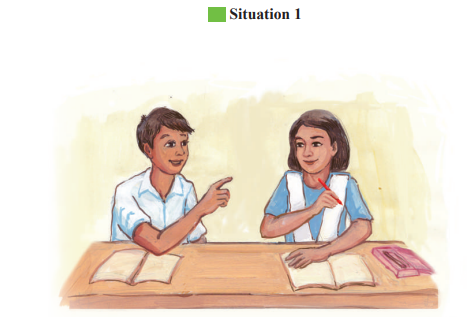
Jibon wants to borrow a pen from Ratna. What should Ratna do?(জীবন রত্নার কাছ থেকে একটি কলম ধার করতে চায়। রত্নার কি করা উচিত?)
Answer:
Jibon: Hi Ratna, could I borrow a pen? I forgot mine at home.
Ratna: Sure, Jibon. I can lend you one. Here you go.
Jibon: Thank you so much! I might have been in trouble without it.
Ratna: No problem. Just make sure to return it to me later. You must take care of it.
Jibon: I will. Thanks again, Ratna!
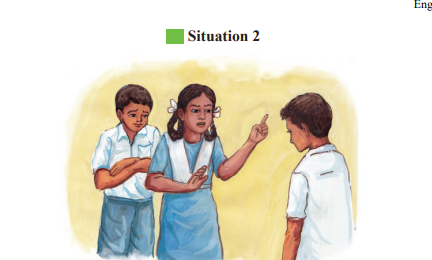
Someone is bullying your friend. What can you do?( কেউ তোমার বন্ধুকে উত্যক্ত করছে। তুমি কি করতে পারো?
Answer:
You: Hey, I noticed someone was bullying you. Are you okay?
Friend: Not really. I feel really upset.
You: We must tell a teacher. They can help stop the bullying.
Friend: I’m scared to do it alone.
You: You should not face this alone. I will come with you.
Friend: Thanks. What if it happens again?
You: We might need to stay together during breaks. Also, you can always talk to me
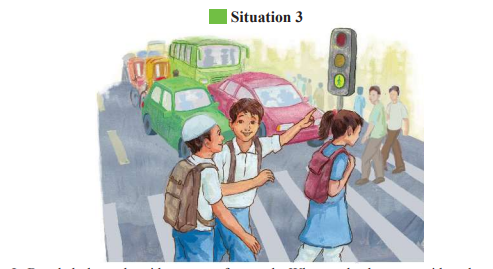
In Bangladesh, road accidents occur frequently. What can be done to avoid road
accidents?( বাংলাদেশে প্রায়ই সড়ক দুর্ঘটনা ঘটছে। রাস্তায় দুর্ঘটনা এড়াতে কি করা যায় ?)
Answer:
Person 1: Road accidents happen a lot in Bangladesh. What can we do to avoid them?
Person 2: We must follow traffic rules and wear seatbelts. Drivers should drive at safe speeds and not use phones.
Person 1: Anything else?
Person 2: The government can run road safety campaigns to help everyone understand.
Class Six English Unit Nine 9.6 Easy Solution–situation Four to Five
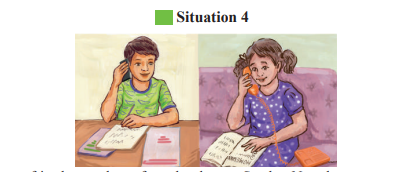
One of your friends was absent from the class on Sunday. Now, how can you help
him?( তোমার এক বন্ধু রবিবার ক্লাসে অনুপস্থিত ছিল। এখন, তুমি কিভাবে তাকে সাহায্য করতে পারো?
Answer:
Friend: I was absent from class on Sunday. Can you help me catch up?
You: Sure! I can share my notes with you and explain what we learned.
Friend: Thanks! What did I miss?
You: We went over the new chapter. You should read it, and I can help with any questions.
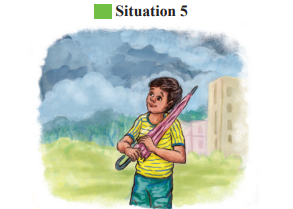
Cloudy Sky. Now, predict the weather.( মেঘলা আকাশ. এখন, আবহাওয়ার পূর্বাভাস দাও।)
Answer:
The sky is cloudy. It may rain today. I should keep an umbrella.
Class Six English Unit Nine 9.6 Unique Solution
Write down 10 sentences using modal verbs about ‘Your responsibility as a student
towards yourself and your community’. For example, you can start with:
As a student, I must study regularly. I should not waste my time————
(Modal Verbs ব্যবহার করে দশটি বাক্য লেখো ‘ছাত্র হিসেবে নিজের ও সমাজের প্রতি তোমার
দায়িত্ব।’ উদাহরণস্বরূপ তুমি নিচের মতো করে শুরু করতে পারো।)
Answer:
- As a student, I must study regularly.
- I should not waste my time on unproductive activities.
- I can help my classmates with their studies if they need it.
- I could participate in community service projects to give back.
- I must respect my teachers and follow school rules.
- I should keep my environment clean by not littering.
- I have to complete my homework on time.
- I may join clubs or groups that benefit the community.
- I might organize study groups to help others.
- I should always be kind and respectful to everyone around me.
New Words
These words, along with their meanings and Bengali translations, should help you understand and use them effectively.
| English Word | Meaning in English | Bengali Translation |
|---|
| Borrow | To take and use something belonging to someone else with the intention of returning it | ধার করা |
| Deduction | The act of subtracting or taking away | বিয়োগ |
| Disobey | To fail to follow rules or commands | অবাধ্য হওয়া |
| Beach | A sandy or pebbly shore by the sea | সৈকত |
| Bullying | The act of intimidating or mistreating someone weaker | অত্যাচার |
| Frequently | Happening often or regularly | প্রায়শই |
| Predict | To say what will happen in the future | পূর্বাভাস দেওয়া |
In conclusion, the Class Six English Unit Nine Easy Solution provides an effective approach to mastering English concepts effortlessly. By employing interactive methods and aligning with curriculum standards, this guide ensures comprehensive learning.
Students can navigate through the complexities of Unit Nine with confidence, supported by clear explanations and engaging activities. Furthermore, the Class Six English Unit Nine Easy Solution emphasizes the importance of regular practice and offers a supportive environment for both teachers and students.
With this resource, students can enhance their English skills and excel academically. Dive into the Class Six English Unit Nine Easy Solution and embark on a rewarding learning journey.
